Cockroach: Ai Weiwei's new documentary on last year's Hong Kong protests ★★★★☆
- Published
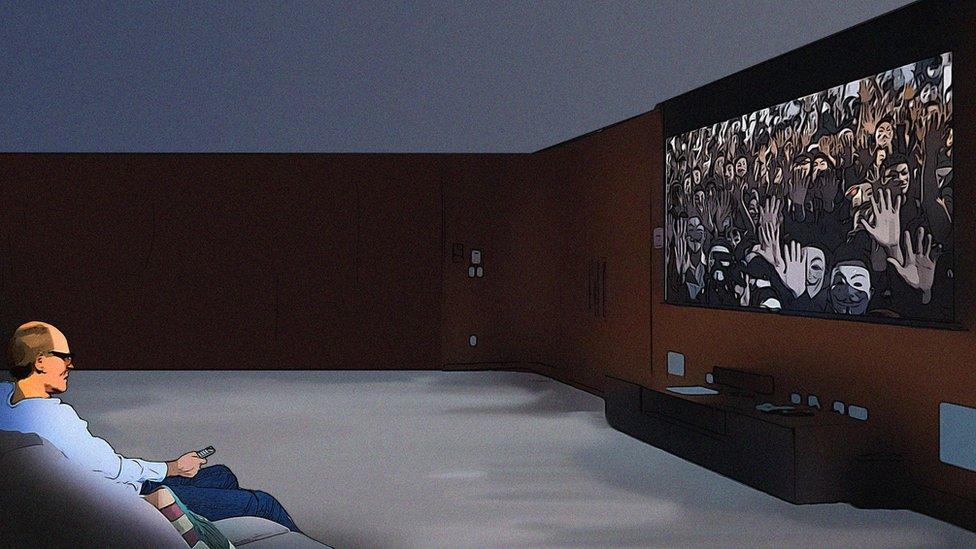
23 years ago, Chris Patten, the outgoing Governor of Hong Kong, made an emotional farewell speech as Britain handed over its prized colony to China. With the Royal Yacht Britannia purring away in the harbour as the ultimate imperial getaway vehicle, he said, "Now Hong Kong people are going to run Hong Kong. That is the promise and that is the unshakable destiny."
"The promise" he was referring to was the one made in the 1984 Sino-British Joint Declaration, in which China agreed that it would run, in effect, a "one country, two systems" policy when it regained sovereignty of Hong Kong in 1997. It would allow the region to "enjoy a high degree of autonomy" for the next 50 years with its current social and economic systems, free press and lifestyle.
Now, Lord Patten is an intelligent man well versed in politics and would have expected some level of state intervention that blurred the lines of that promise. His democratic developments, for instance, were quickly reversed by Beijing.
But he was sincere and confident when he spoke of an "unshakable destiny".
Five years of living in Hong Kong, a place he grew to love deeply, had taught him, he said, that its people's commitment to an open society was in their "DNA".
He was right.
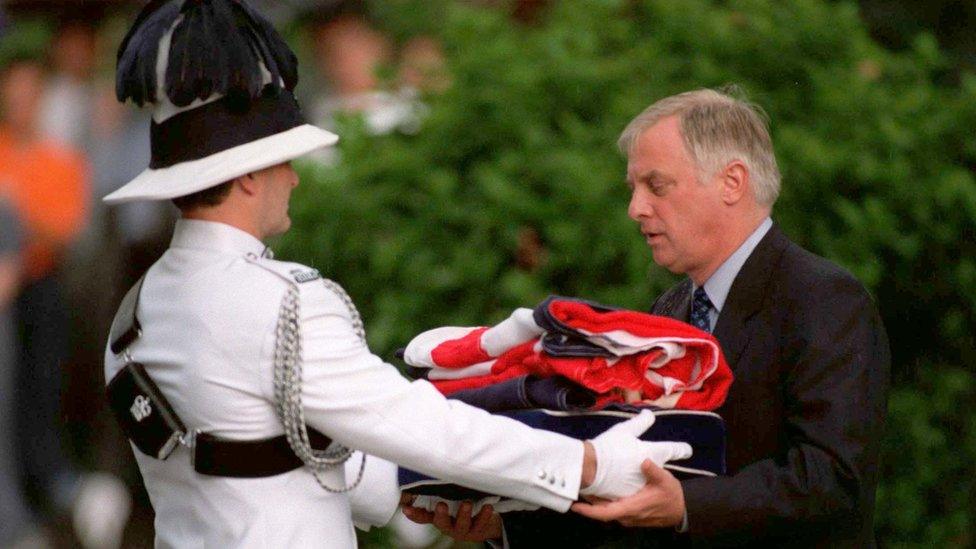
Chris Patten, as the outgoing Governor of Hong Kong, seen here receiving the Union Jack flag and Hong Kong Colonial flag as part of the handover ceremony on 30 June 1997
The locals do not like it when China's ruling Communist Party imposes its political will on what it calls Hong Kong Special Administrative Region of the People's Republic of China (HKSAR).
When it proposed changes to the city's electoral system in 2014 the Hongkongers gathered en masse in public, carrying umbrellas as a symbol of peaceful protest (doubling up, on occasion, as protection from tear gas and pepper spray).
Five years later in 2019 the umbrellas were out again as hundreds of thousands of residents took to the streets, many of whom were not even born when Patten made his speech in 1997. They came to protest against a proposed bill by the Hong Kong government that would enable the extradition of criminal suspects to mainland China.
That was a red line for those in the community deeply suspicious of Beijing's motives and interference.
They feared the new law would erode judicial independence and endanger activists and journalists.
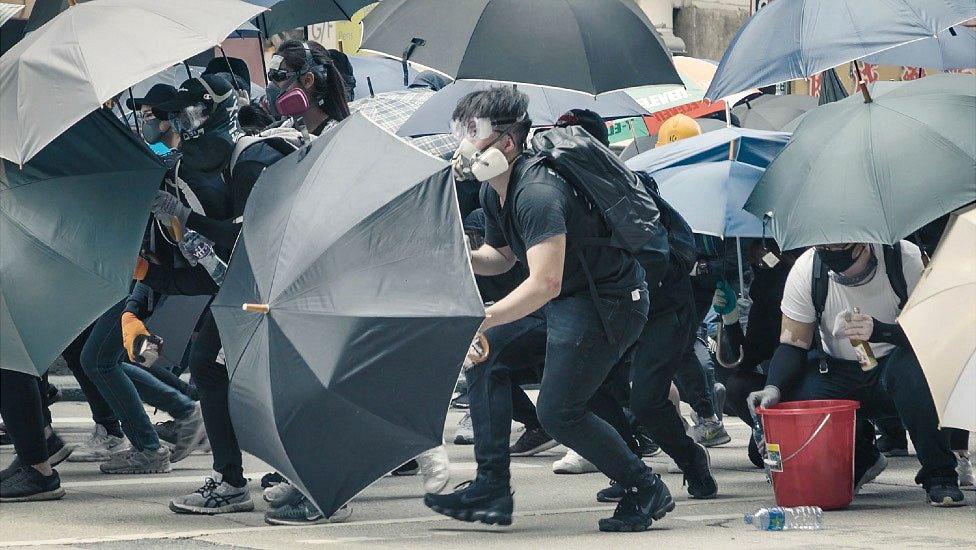
Demonstrators used umbrellas as shields last year, a tactic learnt during the Umbrella Movement of 2014
What followed was bloody and brutal with both sides upping the ante as summer protests gave way to autumn sieges. Police deployed a cocktail of teargas, water cannons, rubber bullets, and live ammunition, while some protesters threw petrol bombs, vandalised buildings and wielded batons.
Positions hardened, tensions rose.
You will probably remember much of this from the television pictures and newspaper reports at the time, but you are less likely to have seen a first-hand account from the frontline. That is what the dissident Chinese artist and activist Ai Weiwei gives us in his latest documentary, Cockroach - the derogatory name police gave to the protesters (who had their own insulting names for the police).
As with all his work it is deeply political and, implicitly, heavily critical of the Chinese government, an administration he and his family have suffered under for decades. Its side is not presented in the 93-minute doc that places you at the sharp end of the action.
It is a protesters' dispatch, giving a voice to those who fear suppression and intimidation.
We see them taking on the police (some of whom, we learn, are conflicted) with a mixture of courage and audacity. Sometimes they perpetrate violence, often they are on the receiving end.
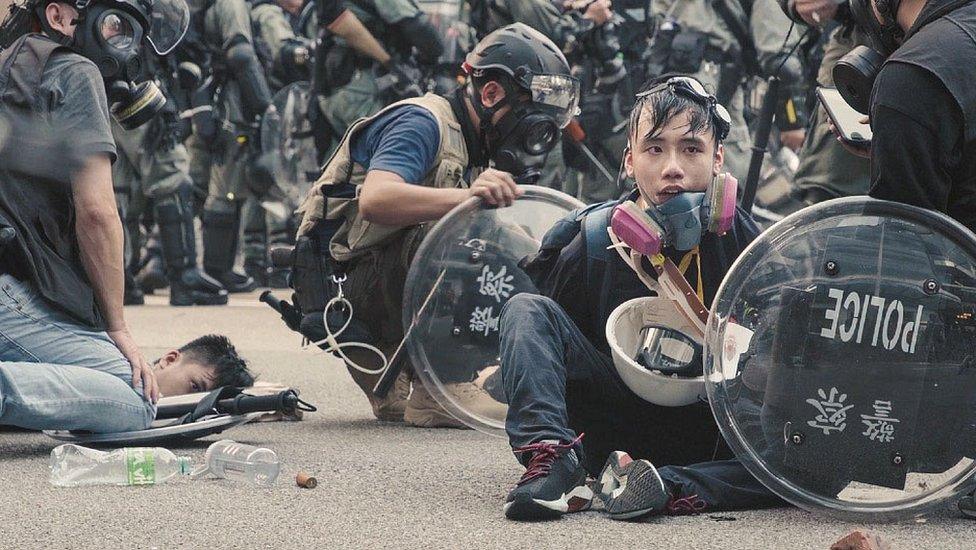
Protesters detained by riot police
Cameras are constantly rolling, lives are put on the line.
It starts with a locked off shot of man standing on top of a 20-metre wall of scaffolding covering the Pacific Place mall in the Admiralty district.
He has his back to us. All we can see of him is his yellow plastic raincoat.
To his right is a handwritten banner that reads: "No Extradition to China".
We hear the traffic below.

The image of this man protesting against the extradition bill became a haunting symbol
The film cuts to a young man on the other side of the street. He is looking up at the isolated protester whose earlier post on social media had prompted him to come along. He says he hopes "he will be fine."
The introduction of an ominous, metallic soundtrack (by Punkgod) suggests he will not be fine.
What happens next is not easy to watch and might be too much for some adults. It is definitely not suitable for children.
Ai Weiwei is a very direct filmmaker, he is not one to sugar the pill.
It is a brutal beginning to a powerful documentary in which distrust and desperation turns a moderate society into a collective of civil rights activists.
There are interviews with pro-democracy politicians, campaigners (some of whom are now in jail) and lawyers, as well as first-person accounts from a section within the protest movement who believe a more aggressive form of direct action is needed to make the authorities agree to their "five demands" (withdrawal of the extradition bill, universal suffrage, amnesty for arrested protesters, retract classification of protesters as "rioters", and an independent inquiry into police brutality).
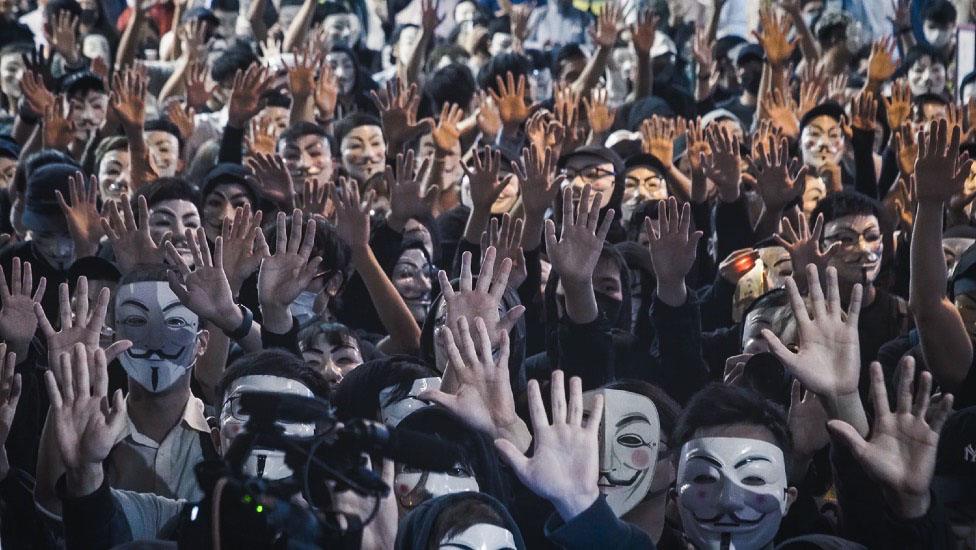
Protesters called for "Five demands, not one less!" and wore masks in defiance of the Chief Executive Carrie Lam's plan to invoke colonial-era emergency powers to ban masks
It is with this more radical group of largely younger activists that we remain as they talk of starting at the back of the protests ("like watching a movie") to being at the business end, nose-to-nose with heavily armed police ("like being in a movie"). The allusion to action films and video games crops up more than once, memorably so when on a rare occasion we hear from a policeman who explains his actions as if it were an exercise at drama school, "It's an act, a script, you play the bad guy."
Sadly, it is all too real.

Police fired tear gas at student protesters at the Chinese University of Hong Kong in November 2019, after a stand-off lead to fierce clashes


The documentary goes from bloody confrontation to bloodier confrontation, drawing you further and further into the psyche of the protesters who are fuelled by a heady mix of adrenalin, fear and purpose: a leaderless band of young people willing to die for their culture and community, for the rights and way of life that was promised to their parents: a promise Chris Patten pointedly reiterated as he left 23 years ago.
Cockroach is their story, told with intensity and integrity by Ai Weiwei, a fine artist who has become an exceptional filmmaker.

Ai Weiwei says "Cockroach is about the most significant struggle for freedom in our time"
It ends with a written update about the new National Security Law imposed on Hong Kong by Beijing in 30 June 2020, which effectively quashed the protests and caused the mass resignation of opposition politicians. It marked the loss of Hong Kong's judicial independence, the text says, and the end of "one country, two systems".
Recent reviews by Will Gompertz:
Follow Will Gompertz on Twitter, external
